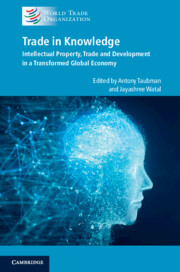Book contents
- Frontmatter
- Contents
- Figures
- Tables
- Contributors
- Preface
- 1 Thematic Overview: Charting the Evolution of Knowledge Flows
- Part I Conceptual Framework
- Part II Measuring Trade in Knowledge
- Part III Impact of Knowledge Flows on Trade and Development
- Part IV Policy, Regulatory and Legislative Frameworks
- Part V Looking Forward
- Index
14 - Trade in Intellectual Property-Intensive Goods
from Part III - Impact of Knowledge Flows on Trade and Development
Published online by Cambridge University Press: 17 February 2022
- Frontmatter
- Contents
- Figures
- Tables
- Contributors
- Preface
- 1 Thematic Overview: Charting the Evolution of Knowledge Flows
- Part I Conceptual Framework
- Part II Measuring Trade in Knowledge
- Part III Impact of Knowledge Flows on Trade and Development
- Part IV Policy, Regulatory and Legislative Frameworks
- Part V Looking Forward
- Index
Summary
Intellectual property rights are common, if controversial, components of trade agreements, and existing evidence on the effects of the introduction of IP rights is mixed. We assess the extent to which the TRIPS Agreement is associated with an increase in trade of knowledge-intensive products. Our approach compares how trade in IP-intensive goods changed relative to trade in a control group of products following a country’s compliance with the TRIPS Agreement. This allows us to isolate the effect of IP protection from changes in trade that result from other aspects of WTO membership, such as reductions in tariffs and improved terms of trade. We also explore differences across IP-intensive sectors, and differences across countries. We find that adoption of the TRIPS Agreement is associated with increased trade in IP-intensive products in both developing countries and high-income countries. Overall, developing countries have seen greater access to innovation exported from the most innovative countries, and these countries have also participated in the global market for innovative products through their own exports.
- Type
- Chapter
- Information
- Trade in KnowledgeIntellectual Property, Trade and Development in a Transformed Global Economy, pp. 431 - 452Publisher: Cambridge University PressPrint publication year: 2022

